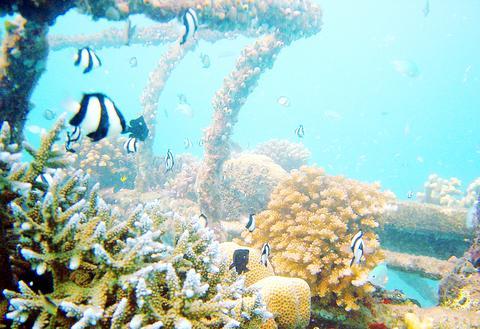Bali is back as one of the top five favorite destinations for Asia-Pacific travelers, less than two years after a terrorist attack killed 202 people on the Indonesian resort island, a new report has shown.
Bangkok remained the top choice, followed by Hong Kong, Singapore and Kuala Lumpur, with Bali in fifth place, according to an analysis by Singapore-based ZUJI, a leading online travel booking company in the region.

PHOTO: AP
London, Jakarta, Taipei and Manila were also among the 10 most visited cities, said the report, which covered the June quarter.
"Bali is back," it said, noting the island, famed for its surf, beaches and local culture, was number 13 in its previous report in the March quarter.
Massive car bombs exploded outside two nightclubs in Bali's entertainment district on October 12, 2002, killing 164 foreign holidaymakers and 38 Indonesians, and devastating the island's tourist industry.
Investigations later showed the Al-Qaeda-linked Jemaah Islamiyah extremist network staged the Bali attacks to avenge perceived Western oppression of Muslims worldwide.
ZUJI's report also showed a rising number of travelers are using their credit cards to pay for their online travel bookings, as concerns about Internet security eased.
In the June quarter, 96 percent of transactions with the company were paid with credit cards, up from 92 percent in the first quarter.
ZUJI, a joint venture between 15 leading Asia Pacific airlines and the US-based Internet travel site Travelocity, has 1 million registered members. It has Internet travel sites in Singapore, Hong Kong, Taiwan and Australia. The report also said electronic tickets, or e-tickets, were becoming more popular in the region.
Nearly a quarter of all international air tickets issued during the June quarter were e-tickets, up from 15 percent in the previous quarter.
There was also a growing trend towards spur-of-the-moment travel and shorter trips. In the June quarter, 67 percent of flights booked were for trips of up to seven days.
High-income households and low-income earners were the ones more likely to shopping for travel online, the report said.
"The lower income household representatives are very likely to be students and younger people, who although on lower budgets, have a propensity to Internet savviness and travel," it said.
The report was based on an online survey, with 8,200 respondents.

June 2 to June 8 Taiwan’s woodcutters believe that if they see even one speck of red in their cooked rice, no matter how small, an accident is going to happen. Peng Chin-tian (彭錦田) swears that this has proven to be true at every stop during his decades-long career in the logging industry. Along with mining, timber harvesting was once considered the most dangerous profession in Taiwan. Not only were mishaps common during all stages of processing, it was difficult to transport the injured to get medical treatment. Many died during the arduous journey. Peng recounts some of his accidents in

“Why does Taiwan identity decline?”a group of researchers lead by University of Nevada political scientist Austin Wang (王宏恩) asked in a recent paper. After all, it is not difficult to explain the rise in Taiwanese identity after the early 1990s. But no model predicted its decline during the 2016-2018 period, they say. After testing various alternative explanations, Wang et al argue that the fall-off in Taiwanese identity during that period is related to voter hedging based on the performance of the Democratic Progressive Party (DPP). Since the DPP is perceived as the guardian of Taiwan identity, when it performs well,

The Taiwan People’s Party (TPP) on May 18 held a rally in Taichung to mark the anniversary of President William Lai’s (賴清德) inauguration on May 20. The title of the rally could be loosely translated to “May 18 recall fraudulent goods” (518退貨ㄌㄨㄚˋ!). Unlike in English, where the terms are the same, “recall” (退貨) in this context refers to product recalls due to damaged, defective or fraudulent merchandise, not the political recalls (罷免) currently dominating the headlines. I attended the rally to determine if the impression was correct that the TPP under party Chairman Huang Kuo-Chang (黃國昌) had little of a

At Computex 2025, Nvidia CEO Jensen Huang (黃仁勳) urged the government to subsidize AI. “All schools in Taiwan must integrate AI into their curricula,” he declared. A few months earlier, he said, “If I were a student today, I’d immediately start using tools like ChatGPT, Gemini Pro and Grok to learn, write and accelerate my thinking.” Huang sees the AI-bullet train leaving the station. And as one of its drivers, he’s worried about youth not getting on board — bad for their careers, and bad for his workforce. As a semiconductor supply-chain powerhouse and AI hub wannabe, Taiwan is seeing